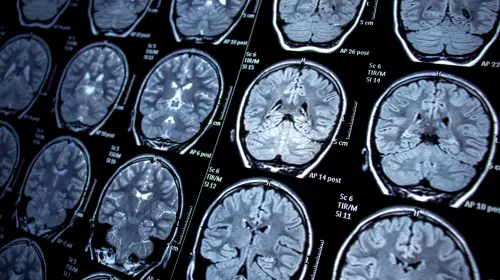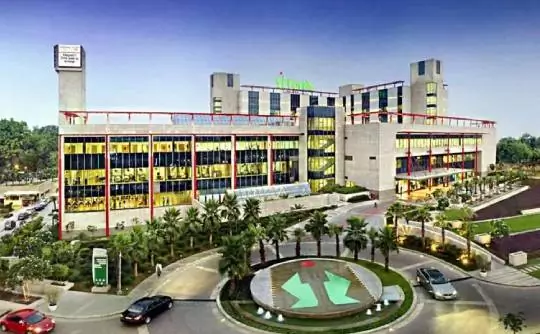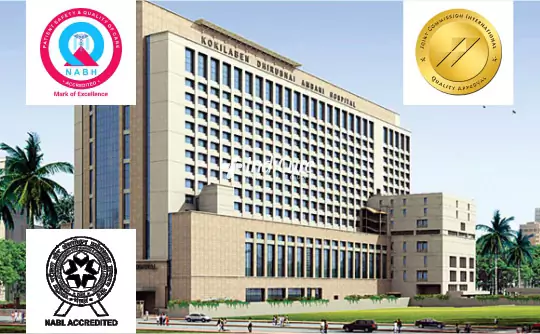

Neurosurgery is a highly specialized and demanding field, focused on treating intricate organs such as the brain and spinal cord. Any trauma or disorder affecting these vital areas requires the expertise of skilled neurosurgeons who have undergone extensive training in this complex discipline. Additionally, the hospital must be equipped with state-of-the-art technology and facilities to handle such advanced procedures.
IndiCure Health Tours partners with some of the leading neurosurgery hospitals in India, offering patients access to cutting-edge treatments at affordable costs, ensuring the highest standards of care throughout their medical journey.
Here's a Quick look at Neurosurgery cost in India:
Below is a list of the neurosurgery procedures we offer, along with the neurosurgery cost in India:
| Procedure | Approx Cost ($) |
|---|---|
| Brain Tumor Surgery | Starts from 4,900 |
| Meningioma Surgery | Starts from 5,200 |
| Gamma Knife for Brain Tumor | Starts from 6,900 |
| Cyberknife | Starts from 6,500 |
| Pituitary Tumor Excision Surgery | Starts from 4,900 |
The cost provided above is an estimate and should not be considered the neurosurgery cost in India. The actual cost will be determined after the surgeon evaluates the patient. Please note that the cost in Indian Rupees may vary depending on the exchange rate.
One of the key factors influencing the neurosurgery cost in India is the neurosurgeon's fee. IndiCure Health Tours partners with board-certified surgeons renowned for their extensive experience and proven success in performing complex procedures. While the surgeon's fee may vary based on their expertise and reputation, IndiCure ensures you are connected with professionals who prioritize your safety and deliver outstanding results for your neurosurgery in India.
There are a variety of treatments available for different neurological conditions, and the approach depends on the specific issue at hand. For example, one patient with a brain tumor may require a craniotomy, while another might benefit from a gamma knife procedure. Similarly, a patient with epilepsy may need surgical intervention, while another could manage with medication alone. As a result, the cost of treatment can vary based on the procedure, the patient's medical condition, and other influencing factors.
Choosing an accredited surgical center with experienced and qualified medical professionals is crucial for successful neurosurgery in India. Major cities such as Mumbai and Delhi offer advanced medical infrastructure and access to highly skilled surgeons, which may result in higher neurosurgery cost in India. To guarantee exceptional care and patient safety, IndiCure Health Tours recommends leading surgical facilities in these cities.
Surgery-related costs encompass both pre-operative and post-operative expenses. Pre-operative costs depend on factors like the patient's age and medical condition, which dictate the required investigations and their complexity. Post-operative expenses typically include prescribed medications and follow-up consultations to monitor recovery.
At IndiCure Health Tours, we combine the majority of expenses for your neurosurgery in India, offering an all-inclusive and budget-friendly package that is customized to your specific needs and financial requirements. Once we receive your medical reports, your dedicated case manager will provide an estimated neurosurgery cost in India based on discussions with the surgeon.
The final neurosurgery cost in India, however, will be confirmed after your in-person consultation with the neurosurgeon.

We Help you Choose the Right Treatment, Surgeon & Hospital

We Arrange Video/Telephonic Consultation with the Surgeon

We Assist you with Visa & Accommodation

We Receive you at the Airport and Drop you at Hotel/Hospital

We Assist you the at Hospital & Provide Post Operative Support
Planning your medical tour to India with IndiCure Health Tours will enable to avail exclusive savings. We partner with the best hospitals to negotiate special surgery rates, ensuring you get the best possible price on your surgery when you plan your medical tour with us.

India has several super specialty hospitals that are equipped with the latest technology and advanced medical equipment like Brain Suite which is fitted with intra-surgery MRI imaging. Besides, the hospitals have JCI and NABH accreditations and are built on international guidelines.
In addition, newer techniques, and technologies are being constantly developed in this field and the neurosurgeons in India keep themselves abreast with these latest developments. You can find some of the world-renowned neurosurgeons in India who are highly qualified and have years of experience in handling various kinds of complex surgeries. This will ensure fewer complications and a higher success rate. Many of them have been trained abroad or have international work experience.
Why Is The Neurosurgery Cost In India So Affordable When Compared To Western Countries?
The affordability of neurosurgery in India compared to Western countries can be attributed to several key factors:
These factors collectively make neurosurgery in India a cost-effective option for patients seeking high-quality medical care at a fraction of the cost found in Western countries.

Gurgaon
Fortis Memorial Research Institute (FMRI), the flagship hospital of Fortis Healthcare, is a multi-specialty, quaternary care hospital and is counted among the best hospitals in India and the world. The hospital is considered as "Mecca of Healthcare" and a referral hospital, not only in the entire Asia Pacific but much beyond.

Mumbai
Kokilaben Dhirubhai Ambani Hospital is one of the most advanced and modern hospitals in India. It is a state-of-the-art tertiary care multi-specialty hospital located in the biggest suburb of Mumbai- Andheri. The hospital was launched by Reliance Group in 2008.
Neurosurgery is the surgical treatment and care of injuries and medical conditions affecting the brain, spinal cord, and nerves.
Surgical treatment, radiation, and stereotactic surgical treatment are the three main options for metastatic brain cancers.
Surgery and medications are used to treat pituitary adenoma.
For a brain aneurysm, there are two significant treatment options: surgery and endovascular therapy.
Our surgeons make every effort to make sure there is minimal risk involved with the surgery. However, the brain is a very complex and sensitive organ. Brain surgery has risks associated with it that include seizures, fever with chills, severe headaches, bleeding, nausea, vomiting, swollen ankles, and various other symptoms.
One of the most common complications of a burst brain aneurysm is bleeding to a larger volume, which does not shut off on its own.
PVA is a relatively new method, but its results have been excellent up to this point.
Before you are discharged, your surgeon will go over the post-surgery care with you in detail.
You or your attendant can make an appointment by calling us or sending a WhatsApp message at +91 932-003-6777. If you have gone to another specialist, his notes will be sought for references to assess your present status before an appointment is confirmed. Depending on your health, a CT scan, MRI, or X-ray may be required.
Please bring all your medical records and papers, any CT scan, MRI, or other imaging relating to your ailment on a compact disc (CD). The CD can be obtained from the facility where the CT scan or MRI was performed.
A neurosurgeon is trained in the diagnosis and treatment of the entire system, which includes the brain, spinal cord, and spinal column, as well as the nerves that run through other parts of the body. No other surgical specialty trains to the same extent as board-certified neurosurgeons in the prevention and management of surgical complications.
Though many patients consider neurosurgeons to be "mind surgeons," it's interesting to note that the majority of operations performed by neurosurgeons were unusual spine surgery. Microdiscectomy, cervical and lumbar fusion, laminectomy, instrumentation, and other spine surgery treatments are all available to neurosurgeons.
Surgery may be advised for people with a variety of spine-related medical issues. Disc herniation, deformity, spinal stenosis, instability, fractures, malignancies, and other spinal disorders are among them. Surgery is frequently recommended for patients who have failed to respond to standard treatment but are still experiencing severe indications and symptoms that are interfering with their daily lives. If you have weakness in your arm/s or leg/s, have a change in bowel or bladder function, or have significant discomfort that suddenly goes away, you should be assessed for surgery.
There are risks associated with any surgical operation. However, these risks are minimal when performed under the supervision of a well-trained, dedicated, and board-certified neurosurgeon. Paralysis, hemorrhage, numbness, spinal fluid leaking, contamination, and wound healing issues are all risks. There is also a danger of problems owing to other illnesses the patient may have, such as diabetes, chronic pain, hypertension, or the need for a future surgical procedure. Before undergoing any surgical operation, speak with your physician about the risks that are specific to your condition and procedure.
Every patient is different and so is the recovery time. The patient's positive attitude and motivation are arguably the most essential factors in the speed of recovery. Age, general health, and various medical disorders are among the other factors.
The recovery also depends on the type of surgery you have. Some procedures, such as spinal fusions, may necessitate extensive spinal exposure, with recovery times ranging from six months to a year. Other surgical procedures, such as those performed with little intrusion, may allow the patient to heal faster - within four to six weeks.
Because the level of pain you may experience differs from patient to patient, pain management also varies. Some pain is an unavoidable side effect of most surgical treatments, and the severity of the pain is determined by the type of surgery, the likelihood of complications, and a variety of other factors. The good news is that there is a plethora of really effective drugs available to help reduce pain and keep it under control. Professionals suggest that well-controlled discomfort can speed recovery and prevent long-term issues, in addition to providing more comfort. Many patients report experiencing fewer aches after surgery than they did prior to the procedure. The first few days after a surgical procedure are the most painful, but as you heal, your discomfort will subside.
You probably can't drive if you want to immobilize a bodily part or if you can't bend a joint. Driving entails several maneuvers that must be completed without difficulty before returning to the driver's seat. Your doctor will be able to inform you when it is safe to drive after the surgery.
Second, you must ensure that you are physically capable of safely operating a car and reacting quickly and correctly to abrupt or unpredictable situations. According to studies, even wearing a basic wrist splint for a few weeks can significantly reduce your ability to handle a car and response times. It is prohibited to drive while taking medications that produce dizziness, sleepiness, or a reduction in response time.
While the question of intercourse after surgical treatment is not uncommon, many individuals are hesitant to inquire. The answer is that it depends on you and the type of surgical treatment you are receiving. When you are able to resume your normal routine and physical hobbies after a simple medical treatment, you must be able to have intercourse. Allowing ache to be your guide is one option. You may also feel as though you've recovered after surgery, yet pain is inevitable when you try to have intercourse. This is your body's way of telling you that you aren't ready, and that you need to heal more before having sex. However, in some cases, pain can be avoided by making a few simple changes in function. Sex is considered a demanding activity if your healthcare practitioner advises you to avoid strenuous activities like walking, fast exercise, etc.
All you need to apply for a medical visa to India is a valid passport, as well as proof that you are seeking medical treatment from a recognized and reputable facility in India. Under separate attendant visas, two blood relations are permitted to accompany the patient.
Enhance your medical journey to India by availing these extra services.
Traveling abroad for medical reasons may be challenging. With our experience of over a decade and working with the best surgeons and top hospitals in India, we help make your medical tour easier and safer for you. We will guide you at every step of the way and make end-to-end arrangements for your surgery, travel, and stay.
Ramandeep Dhaliwal
I had great experience having rhinoplasty through Indicure. Dr. Ruchika from Indicure has helped me in finding best plastic surgeon, answering all my questions...
Read More
Joshua Archer
My name is Joshua Archer I'm from New Zealand, bay of plenty, kawerau I opted for the bypass surgery in January 2023 but planned it in advance for 28 September found IndiCure...
Read More
Kera Ren
Absolutely loved my experience with IndiCure - from first inquiring to meeting the surgeon pre op to my follow up post op. The surgeon was extremely approachable...
Read More
Andreana Paul
Had a wonderful experience. Visited India for my plastic surgery. From sending mails, airport pickup, comfortable accommodation and, to smooth hospital appointment booking...
Read More
Brandi Luce
I had the privilege of using Indicure's services for a cosmetic procedure that I had wanted for a long time but had always been apprehensive about. Ruchika helped me...
Read More
Jade M
Indicure Health Tours went above and beyond my expectations. They helped me with every aspect of my journey and were professional, kind and caring. I was...
Read More
The content on the website (www.indicure.com) is intended to be general information and is provided only as a service. All photographs on our website of before and after results are examples only, and do not constitute an implied or any other kind of certainty for the result of surgery.
Learn about IndiCure Health Tours' comprehensive editorial policy that strives to deliver trustworthy, helpful, relevant, accurate and people-first content on medical tourism in India.
It is not medical advice and should not be taken as medical advice. It should not be used to diagnose or treat a health condition and is in no way meant to be a substitute for professional medical care. You are advised to see a surgeon in person to assess what surgery may or may not accomplish for you.
It is also important to keep your expectations realistic and to understand that all surgical procedures carry risks and should never be taken lightly.